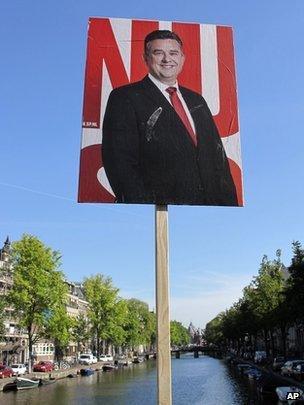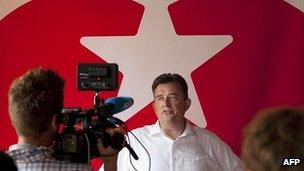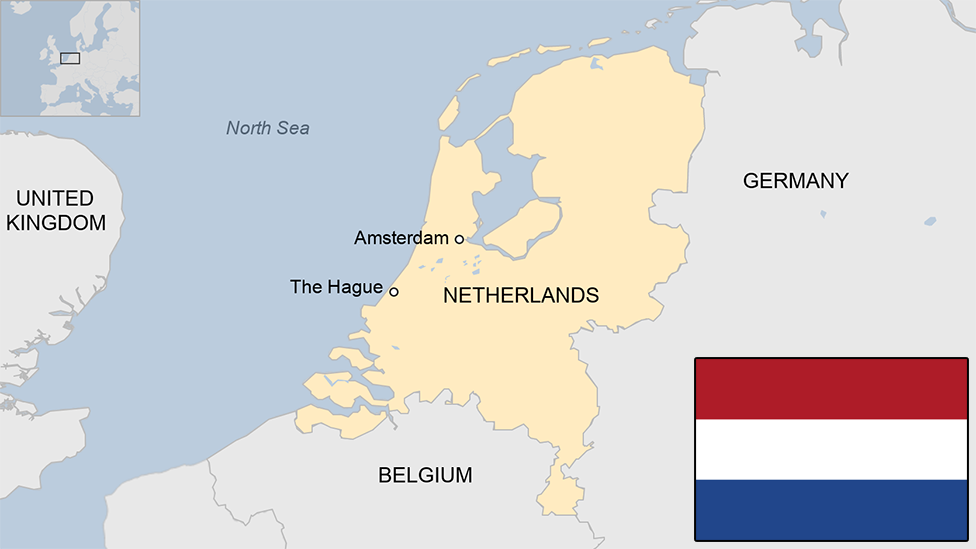Dutch election: Emile Roemer seduces with Socialist charms
- Published

Emile Roemer has struck a chord with disenchanted voters
Political billboards have sprung up across the Netherlands, with a general election due to take place on 12 September under the shadow of the eurozone crisis.
According to polls, economic pessimism has sent voters scattering across the political spectrum.
Believing mainstream parties have failed to protect them from aching rounds of austerity, record numbers of voters look set to seek shelter in the arms of outsiders.
Nothing illustrates this shift more than an unprecedented surge in support for the Socialists (SP) - a party which has always been to the left of the more mainstream Labour.
It still alludes to past Maoist allegiances with its emblem of a white star in a red tomato, harking back to the days when activists hurled fruit at opponents during protests.
Populist power
Recent polls suggest they could win the election, or come second to the centre-right Liberals (VVD).
The left-wing Socialists are capturing voters' imagination in the same way the right-wing Freedom Party (PVV) did just before the country's last few elections.
In theory the parties are polar opposites. In practice, Socialist Party leader Emile Roemer and controversial Freedom Party front man Geert Wilders share two critical positions: both are eurosceptic, both pro-welfare.
Polls suggest Mr Wilders's popularity is waning, while Mr Roemer is the rising star.
"I've never seen anything like this. It's totally splintering," says Ron Meerhof, a seasoned political journalist at the popular Volkskrant newspaper.
"Voters are going all over the place, they're very volatile. They feel like the big parties don't have the answers. It's interesting and impossible to predict what will happen."
At a Freedom Party rally in Rotterdam there was a conspicuous number of empty chairs.
I asked Mr Wilders if he would be willing to join forces with Mr Roemer to form a government.
"I have not excluded anyone," he said.
And he made clear the party's anti-Islamic platform was no longer its main campaign theme.
"I believe Europe is the only subject that matters in these elections. We don't want to be a slave of Brussels - we want to be an independent country and this is the choice we are offering the electorate."
Emile Roemer appears to be an attractive prospect for the disenchanted masses - a smiling, self-assured, open-collar-and-no-tie man.
In the popularity stakes, he comes in just behind the nation's favourite Queen Beatrix.

The SP's tomato emblem harks back to the days of fruit-throwing protests
But some of the same people believe he is too lightweight, too inexperienced, to take charge of the country. In leadership polls he is down in fourth place.
"They just don't see him as a prime minister. They see him as a guy who understands them, someone who is like them and can soften the blow from the crisis," explains political analyst Andre Krouwel.
"He is associated with fighting and protest, not someone who can unify different parties to form a coalition."
'Over my dead body'
His Socialist party has consistently refused to toe the Netherlands' euro-enthusiastic line.
It voted against rescue packages for Spain and Greece, budget deficit targets and the new ESM bailout fund.
The Socialists favour stimulus over austerity.
When asked whether the Netherlands would pay the European Commission fine for failing to hit its 3% budget deficit target, Mr Roemer's response was a resolute "Over my dead body!"
Dutch Finance Minister Jan Kees de Jager immediately warned that such "irresponsible comments" threatened to undermine market confidence.
But the SP's spokesman on Europe, Harry van Bommel, insists austerity is "not the way to get ourselves out of this crisis".
"We can only restore confidence by showing we'll create growth and that will only happen if the government invests in the country," he says.
"The austerity measures will definitely not stimulate the economy: they will hurt small and medium enterprises, they will hurt people with low incomes."
Part of the Socialists' success has been to occupy space left by what has traditionally been the main left-wing party, Labour.
Some Labour voters felt abandoned when it made policy concessions in order to join the centre-right coalition formed after the last election.
Business fears

The election could put the Dutch-German austerity axis under pressure
The Socialists want to raise income tax from 52% to 65% for those earning more than 150,000 euros (£119,000).
My landlord looks anxious when I mention the prospect of a Roemer-led government.
"They will kill the economy. They want to make such high taxes for companies that many will shut down. Then how will they pay for all the benefits they want to give out to old people and the unemployed?"
The result of the election may have wider repercussions, too.
The Netherlands has become known for taking a hard line on austerity, refusing to let southern Europe off the hook.
But if the Socialists put in a strong showing, the Netherlands' own commitment to fiscal discipline will be called into question, and Chancellor Angela Merkel's austerity-led strategy will come under growing pressure.
- Published2 July 2024
